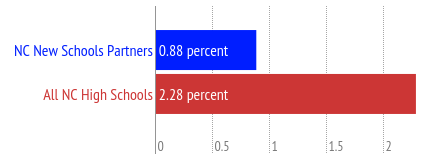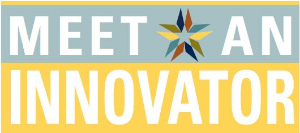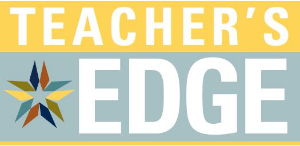|
Welcome to INNOVATOR, an update on school and district transformation from North Carolina New Schools. Our newsletter aims to inform practitioners, policy makers, and friends of public education on innovation, workforce development, research and success stories from schools, districts and regions across the state. Please contact us to provide feedback and suggest ideas.
|
|
Northeastern NC gets STEM-focused charter
|
Students in Elizabeth City and surrounding counties will benefit from a new school option in August, when the Northeast Academy of Aerospace and Advanced Technologies opens on the campus of Elizabeth City State University. The new school, which will be the first charter on a UNC campus, won unanimous approval earlier this month from the State Board of Education.
The innovative new STEM-focused school - with NC New Schools as a key partner - is aimed at equipping students with skills sought by a growing aerospace industry in the Elizabeth City area. The U.S. Coast Guard Air Station in Elizabeth City is the largest of its kind in the  country, employing about 1,400 civilians and enlisted personnel, and the Aviation Research and Development Commerce Park serves as an incubator for aerospace-related business and industry. Local employers, such as DRS Technologies, have communicated a strong need for skilled workers. The jobs are there; the skilled workers are not. country, employing about 1,400 civilians and enlisted personnel, and the Aviation Research and Development Commerce Park serves as an incubator for aerospace-related business and industry. Local employers, such as DRS Technologies, have communicated a strong need for skilled workers. The jobs are there; the skilled workers are not.
The new high school will provide new pathways for students to take advantage of these kinds of opportunities and be able to join the skilled workforce they support. More broadly, the school's focus on science, technology, engineering and math will allow students to develop skills in high demand by a wide range of industries across the state and nation: critical thinking, problem solving, collaboration, communication.
Read more ...
|
|
Innovative high schools count few dropouts
|
Dropout data released this month by the state show that schools that are part of the NC New Schools network continue to outpace statewide results for all high schools. Schools served by NC New Schools for at least three years achieved a combined dropout rate for 2013-2014 of 0.88 percent, compared to 2.28 percent for all high schools in the state, including the 89 innovative schools.

Sixty of the 89 schools lost no students as dropouts, up from 54 schools in 2012-2013.
Distinct from the four-year graduation rate, the dropout rate is the percentage of students who quit school in a single year. Some students may return the following year while others may quit more than once. The graduation rate reflects the percentage of ninth graders who graduate within four years (five years for many early college high schools).
Source: Consolidated Data Report, 2013-2014, NC Department of Public Instruction; NC New Schools analysis
|
Mayor on a mission to expand opportunities
|
|
| Joe Peel
Mayor of Elizabeth City |
Chances are that few mayors in North Carolina can make the claim that they helped found a charter school.
Joe Peel can.
Mayor Peel isn't just any mayor, either. Peel, now in his second term as mayor of Elizabeth City, is a retired public school career educator who spent eight years as superintendent of Elizabeth City-Pasquotank school district. That's probably not your typical profile of a charter school leader.
But earlier this month, when the State Board of Education unanimously approved the Northeast Academy of Aerospace and Advanced Technologies, Peel's proposal for filling what he and  other local leaders saw as an educational void became reality for the community and prospective students. other local leaders saw as an educational void became reality for the community and prospective students.
"If I had not become mayor, I wouldn't have done the charter," Peel said in a recent interview.
Peel didn't set out to open a charter school. His objective was to solve a growing problem for the city in northeastern North Carolina, struggling with a widening gap between the skills of the local workforce and the skills needed by local employers. As home to the U.S. Coast Guard's largest air station in the nation, Elizabeth City and its surrounding area has seen promising growth in jobs related to aerospace and aviation. But Peel said employers in the field have been reluctant to expand because of a shortage of high-skilled workers.
Read more ...
|
|
Report: College completion a hurdle for many
|
Even as more high school graduates nationally are enrolling in college -- pointing to increased access to postsecondary education -- many students entering two-year colleges don't finish, leaving them no better off than students with only a high school diploma, a new study finds.
Most on-time high school graduates now attend college -- 86 percent within eight years of  completing high school -- with more than a third of them enrolling in two-year colleges. completing high school -- with more than a third of them enrolling in two-year colleges.
But nearly half of those attending community college fail to earn either a two- or four-year degree within eight years, according to The New Forgotten Half and Research Directions to Support Them, released earlier this year by the William T. Grant Foundation.
The report urges deeper research into "the new college reality" to better understand transitions from high school to college and from college to careers. More focus is also needed on alignment between high school and college, school-work linkages and improved guidance and counseling by schools and colleges.
The Rural Innovative Schools Initiative, led by NC New Schools, is aimed at improving student success in high school and college by providing both access and support for students in the college courses they take while still in high school.
Read more ...
|
|
More rigorous learning means more support
|
By Mia PumoNC New Schools Instructional Coach
Imagine you walk into a classroom and the room is buzzing with excitement. Students are working in small groups, participating in discussions, writing and creating. At first glance, it appears these students are highly engaged. Everyone is on task and working hard, every teacher's dream.
But when you look more closely you realize these adolescents are coloring, talking about whom the vampires killed on TV last  night, and creating "get well soon" cards for their classmate who just broke his arm in an unfortunate skateboarding accident. Engaging? Yes. Rigorous? No. night, and creating "get well soon" cards for their classmate who just broke his arm in an unfortunate skateboarding accident. Engaging? Yes. Rigorous? No.
We hear a lot about rigor in the classroom these days, but what does it really mean? Let's begin by stating what it doesn't mean. Rigor does not mean more. More questions, more problems, and more homework do not make a classroom more rigorous. Rigor is about the level of thinking that is occurring when students are engaged in learning.
Barbara Blackburn, one of the nation's leading researchers on classroom rigor, describes a rigorous classroom as one where students are expected to learn at high levels, are supported at high levels and demonstrate learning at high levels (2008).
So if our students are engaged in learning, how do we know if an assignment is rigorous?
Read more ...
|
|
STEM conference highlights promising practices
|
 The 2015 Scaling STEM conference will focus on how to design, create and inspire student engagement. Sessions will highlight promising practices, tools and resources to:
- Design solutions for school-based problems of practice
- Create engagement in critical thinking through the "making" movement
- Inspire through partnerships with industry, community and higher education
The conference, set for April 13-15, at the Sheraton Imperial Hotel & Convention Center in Research Triangle Park, is designed for educators, STEM advocates, education innovation leaders, industry and community leaders and policymakers. The event is co-hosted by the NC Science, Mathematics & Technology Education Center and NC New Schools.
Click here to register and learn more about the conference. |
|
|
|
 |
 |
|
|